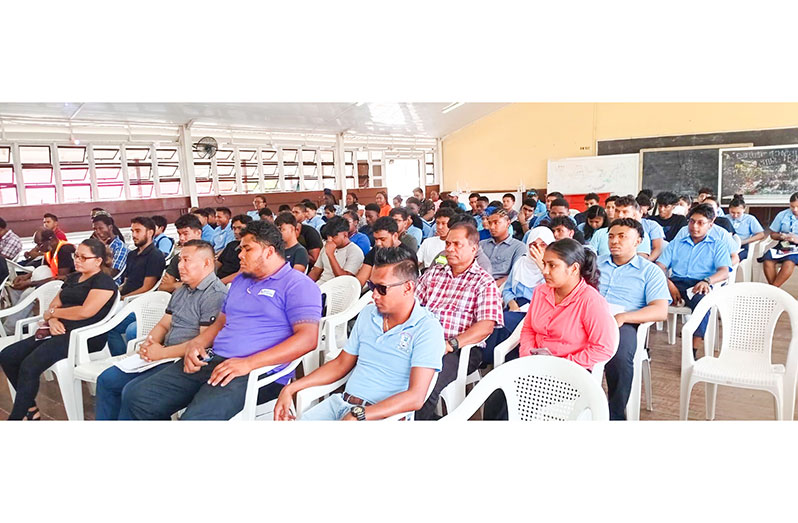THE Board of Industrial Training (BIT), in collaboration with the Basic Needs Trust Fund (BNTF), has launched seven technical and vocational training programmes at the Essequibo Technical Institute (ETI) to equip individuals with essential skills for the job market. The launch took place on January 28, 2025, and marks a significant step in enhancing workforce development in Region Two.
The newly introduced programmes include Heavy Duty Equipment Operation, General Building Construction, Motor Vehicle Engine Repairs, Welding and Fabrication, Electrical Installation, Small Engine Repairs, and General Office Administration. These courses will run for four months, during which participants will receive safety gear and basic resources necessary for their training.

Speaking at the launch event, several key stakeholders underscored the importance of vocational training in driving national development. Among the speakers were Vilma De Silva, Regional Chairwoman of Region Two; Shabana Omar, Project Engineer for BNTF; Mohammed Shaheed, Technical Officer of BIT; and Shivnarine Jasodra, Deputy Principal of ETI. The event was also attended by BIT’s Technical Officer, Lokenauth Rooplall; Labour Officer Ravi Persaud; OHS Officer Naipaul Persaud; a Community Liaison Officer of BNTF, and lecturers from ETI.
The Government of Guyana has committed significant resources to the enhancement of vocational training and skills development programmes across the country, recognising their crucial role in strengthening employability in key industries such as oil and gas, agriculture and agro-processing, tourism, and services.
Minister of Labour, Joseph Hamilton, in a recent interview, emphasised that the Ministry aims to train approximately 4,000 individuals in 2025 through various skills development initiatives. He noted that prior to 2020, BIT trained between 1,300 and 1,500 individuals annually. However, over the past four years, the Board has significantly expanded its reach, training approximately 12,742 individuals nationwide.
Minister Hamilton further highlighted additional training programmes set to be implemented under the Ministry this year. One such initiative is a two-year programme, funded by the World Bank and supervised by the Guyana Energy Agency, which will train 20 women—two from each region—in an apprenticeship programme focused on electrical installation and basic photovoltaic (PV) technology. This follows a similar initiative funded by the Inter-American Development Bank (IDB), which trained 75 women from Regions Seven and Nine in solar PV technology.
Another major programme being rolled out in 2025 is a partnership between BIT and the Canadian company G-Mining to provide technical skills training for prospective employees. This initiative will focus on areas such as welding, mechanics, Heavy Duty Equipment Operation (HDEO), instrumentation, and pipe fitting. At BIT’s training facility in Bartica, approximately 1,500 individuals will be trained to work at the mining site, with additional batches set to undergo training as the mine becomes operational. The primary beneficiaries of this initiative will be residents of Region Seven, including both men and women.
Additionally, Minister Hamilton reaffirmed the Ministry’s commitment to supporting the National Commission for Disability in training persons with disabilities in multiple skill areas. The Ministry will also expand its apprenticeship programmes in collaboration with various companies to provide hands-on training opportunities for young professionals.
These efforts reflect the government’s continued investment in vocational training as a pathway to employment, economic growth, and national development.



.jpg)











